User:Ahmedbaba/sandbox
The term Moors has referred to several historic and modern populations, used principally in reference to the Berber people[1] but also came to be used for converted Muslims of Iberian descent, and also for other Africans besides Berbers as well as Arabs and Persians who made up the populations of Islamic Spain. However, after the expulsion of the Moors from Spain, the term up to the 19th century was widely understood or accepted as reference to any dark skin person of African descent including, Christians [2]. From their base in northern Africa, they came to conquer, occupy and rule territories in the Iberian Peninsula for varying periods in different regions, ranging from two decades in the north-west to nearly eight hundred years in the south-east. At that time they were Muslims, although earlier these people had followed religions other than Islam. They called the territory they controlled in Iberia Al Andalus, which at its peak comprised most of what is now Spain and Portugal. For a shorter period called Islamic Sicily, they controlled all of Sicily and Malta, as well as other smaller parts of southern Italy.
The Moors never referred to themselves as such; it was a term used mostly by the Europeans who encountered them, beginning with the Greek and Romans and continuing with the Western and Christian Europeans during and after the Islamic conquest of Spain. It is believed that the Berbers refer to themselves as Amazigh or derivatives of that word based on the berber dialect in question. The term Moor is from the Greek word Mauros which means dark and which is believed to be reference to the dark skin of these North Africans.
Although in 1911, The Britannica Encyclopedia observed that "The term 'Moors' has no real ethnological value", scholars throughout the prior historical period have accepted or ackowledged the word to mean reference to any dark skin individual of African descent. This can be observed in early English Latin dictionaries:
"Maurus" was synonymous with "Moor," "negro," and "Aethiops" in John Etick's A new English-Latin dictionary (1783);William Young (1810), "Maurus" is a "black Moor; Ainsworth's Latin Dictionary, Morell's abridgment by Alexander Jamieson, Robert Ainsworth (1828), "Maurus" means "black Moor";
The same is true of early English dictionaries: Moor" meant "negro" or "black-a-moor" in A Dictionary of the English Language (1768) by Samuel Johnson; The Encyclopaedia Londinensis (1817) by John Wilkes lists "moor" as follows: "[maurus, Lat. μαυρο, Gr., black.] a negro; a blackamoor.";John Olgilvie's The Imperial Dictionary of the English Language (1882), a Moor was a "black man or negro"
In fact some of the more famous individual Moors of Europe are not even Moslems or Berber for that matter, but black christians such as St. Maurice.


